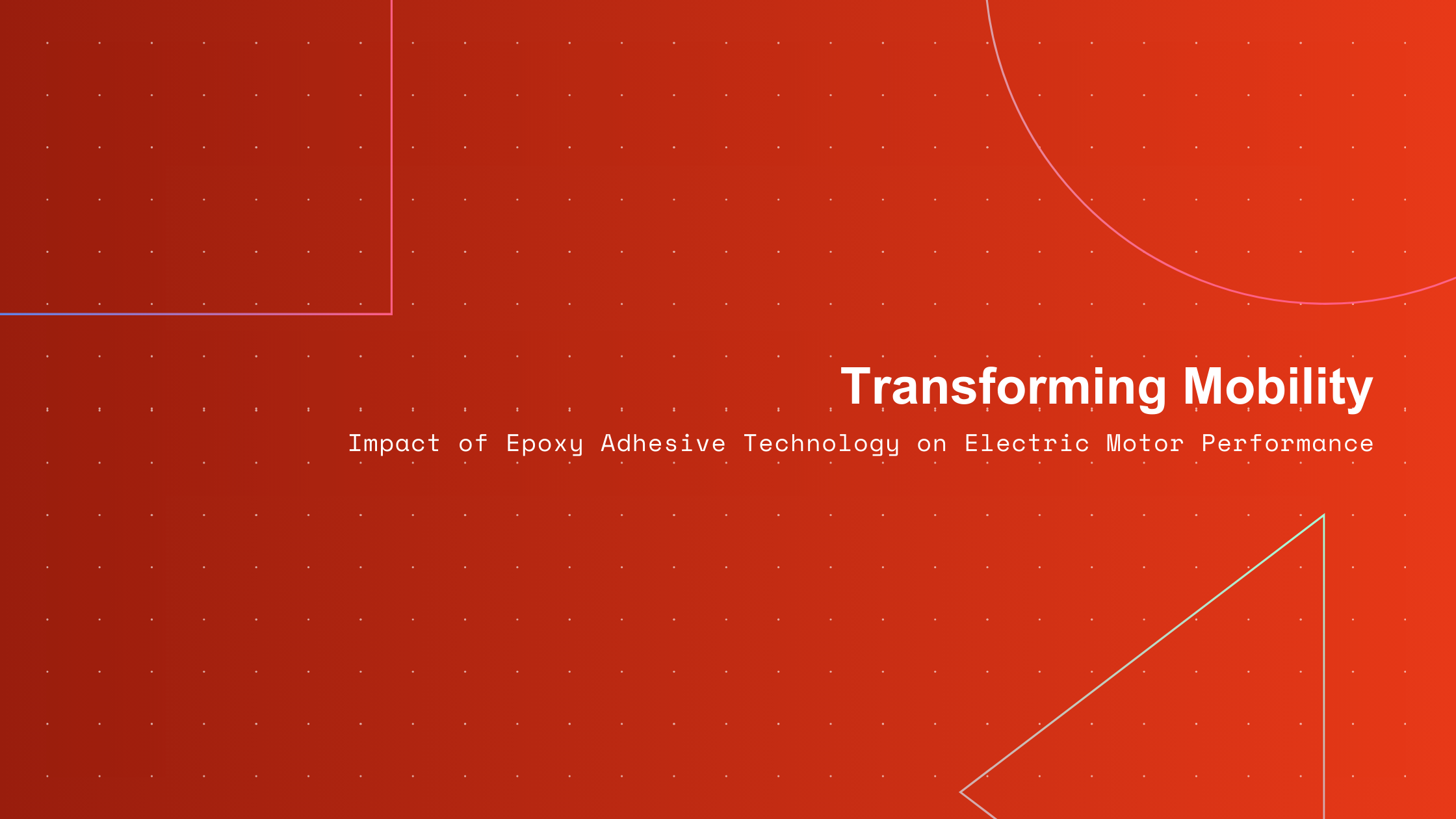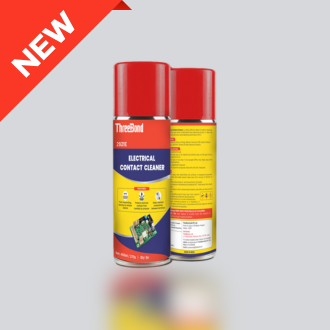
Transforming Mobility: The Impact of Epoxy Adhesive Technology on Electric Motor Performance
In today’s rapidly evolving world, the transition towards sustainable and efficient transportation solutions has become increasingly paramount, with electric vehicles (EVs) emerging as a promising alternative to traditional internal combustion engine vehicles. Electric motors play a crucial role in modern mobility, powering everything from EVs to industrial machinery, and their performance and reliability hinge significantly on the quality of their construction.
Recent advancements in epoxy adhesive technology have revolutionized the way electric motors are built, leading to improved performance, efficiency, and durability. At the heart of electric propulsion systems, electric motors rely heavily on the integrity of their components, and epoxy adhesive technology plays a pivotal role in ensuring their optimal functioning, offering reduced emissions and greater energy efficiency while contributing to the future of mobility.
Epoxy Adhesive Technology: Enhancing Electric Motor Performance
Electric motor manufacturers face a myriad of challenges in designing motors that meet the demanding requirements of modern mobility. From withstanding high temperatures and mechanical stresses to ensuring electrical insulation and chemical resistance, the components of electric motors must exhibit exceptional durability and reliability. Epoxy adhesive technology offers a versatile solution to address these challenges, providing robust bonding, insulation, and protection for motor components.
Types of Epoxy Adhesives for Electric Motors
- Heat-Resistant Epoxy Adhesive: Designed to withstand the elevated temperatures generated during motor operation, heat-resistant epoxy adhesives maintain bonding strength and structural integrity under extreme thermal conditions. They play a crucial role in ensuring the longevity and performance of electric motors in high-temperature environments.
- Electrical Insulating Epoxy Adhesive: Electrical insulation is paramount in electric motors to prevent electrical current leakage and ensure safe operation. Electrical insulating epoxy adhesives provide reliable insulation between motor components, minimizing the risk of electrical shorts and enhancing overall motor reliability.
- Fast-Curing Epoxy Adhesive: In high-volume production environments or situations requiring rapid assembly or repair of electric motor components, fast-curing epoxy adhesives offer significant advantages. These adhesives enable quick bonding and reduce downtime, contributing to increased efficiency and productivity.
- High-Strength Epoxy Adhesive: Electric motors are subject to mechanical stresses, vibrations, and shocks during operation. High-strength epoxy adhesives provide exceptional bonding capabilities, ensuring the structural integrity and durability of motor assemblies under demanding conditions.
- Chemical-Resistant Epoxy Adhesive: Exposure to various chemicals, solvents, oils, and fuels in motor environments can compromise the integrity of adhesive bonds. Chemical-resistant epoxy adhesives offer protection against chemical degradation, preserving bond strength and reliability in harsh operating conditions.
- Low-Outgassing Epoxy Adhesive: In vacuum environments or applications sensitive to volatile compounds, low-outgassing epoxy adhesives are essential. These adhesives release minimal amounts of volatile substances when exposed to heat or vacuum, ensuring compatibility with sensitive components and environments.
- Flexible Epoxy Adhesive: Flexible epoxy adhesives provide elasticity and vibration absorption, minimizing the risk of bond failure or cracking in dynamic motor applications. They accommodate thermal expansion and contraction, contributing to the durability and reliability of electric motor assemblies.
Two-Part Epoxy Adhesive
Two-part epoxy adhesive requires mixing resin and hardener components before use. It offers versatility, high bond strength, gap-filling capabilities, temperature resistance, chemical resistance, and various application methods.
One-Part Epoxy Adhesive
One-part epoxy adhesive is a pre-mixed, ready-to-use solution designed to provide unparalleled convenience and performance. With instant adhesion, extended shelf life, and versatile application methods, it stands as a reliable choice for various bonding needs. What sets it apart is its unique feature of heat activation, ensuring optimal performance through efficient curing. This adhesive not only guarantees chemical resistance but also offers the flexibility to adapt to diverse applications. Whether you’re working on intricate projects or robust industrial applications, our one-part epoxy adhesive is engineered to deliver consistent and superior results.
Fast-Curing Epoxy Adhesive
Fast-curing epoxy adhesive accelerates curing times, providing rapid bond development, high bond strength, versatility, temperature resistance, chemical resistance, and application flexibility.
High-Temperature Epoxy Adhesive
Designed to withstand elevated temperatures, high-temperature epoxy adhesive offers thermal stability, high bond strength, versatility, chemical resistance, and application flexibility.
Low Outgassing Epoxy Adhesive
Minimizes release of volatile compounds, ensuring compatibility with sensitive components, low volatile content, high bond strength, thermal and chemical resistance, and application flexibility.
Impact of Epoxy Adhesive Technology on Electric Motor Performance
- Enhanced Thermal Management: Heat-resistant epoxy adhesives enable electric motors to withstand elevated temperatures without compromising performance. By dissipating heat effectively and maintaining bond integrity, these adhesives contribute to improved thermal management and motor efficiency.
- Superior Electrical Insulation: Electrical insulating epoxy adhesives prevent electrical current leakage and ensure reliable insulation between motor components. They play a crucial role in maintaining electrical integrity, reducing the risk of short circuits, and enhancing overall motor safety.
- Accelerated Assembly and Repair: Fast-curing epoxy adhesives streamline the assembly and repair processes of electric motors, reducing production cycle times and downtime. Their rapid curing properties enable quick bonding of components, facilitating efficient manufacturing and maintenance operations.
- Increased Mechanical Stability: High-strength epoxy adhesives provide robust bonding between motor components, enhancing mechanical stability and reliability. They withstand mechanical stresses, vibrations, and shocks, ensuring the longevity and performance of electric motors in demanding applications.
- Enhanced Chemical Resistance: Chemical-resistant epoxy adhesives protect motor components from exposure to corrosive substances, extending the service life of electric motors in harsh environments. They prevent chemical degradation of adhesive bonds, preserving bond strength and integrity over time.
- Compatibility with Sensitive Environments: Low-outgassing epoxy adhesives minimize the release of volatile compounds, making them suitable for use in sensitive environments such as aerospace or electronics. They ensure compatibility with delicate components and prevent contamination or performance issues.
- Improved Durability and Reliability: Flexible epoxy adhesives accommodate dynamic movement and thermal expansion in electric motor components, reducing the risk of bond failure or cracking. They contribute to the overall durability and reliability of motor assemblies, enhancing performance and longevity.
Conclusion
Epoxy adhesive technology plays a pivotal role in enhancing the performance, reliability, and efficiency of electric motors in modern mobility applications. By providing robust bonding, insulation, and protection for motor components, epoxy adhesives enable electric vehicles to meet the demanding requirements of sustainable transportation. As the automotive industry continues to transition towards electrification, the importance of epoxy adhesive technology in transforming mobility cannot be overstated. With ongoing advancements in adhesive formulations and manufacturing processes, the future holds promising opportunities for further innovation and optimization in electric motor performance.






Post a comment